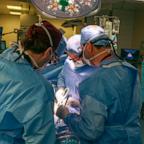If Mom or Dad Is Depressed, Kids Need Help Too
June 11 -- WEDNESDAY, June 10 (HealthDay News) -- When parents are depressed, their children can suffer too.
A new report from the National Research Council and the Institute of Medicine calls for health and social service professionals to pay greater attention to the impact of parental depression on their children.
Rather than treating only the depressed adult, health-care and mental-health professionals should evaluate the fallout of the depression on the entire family, particularly children, and design treatment programs with everyone in mind, according to the report that was to be released Wednesday.
Since most depression counseling and treatment programs are designed to deal only with the depressed individual, federal and state agencies, nonprofit organizations and private-sector providers should work to find nontraditional ways of helping the whole family, the report says.
"To break the vicious circle of depression, we need to refocus our view of this illness through a broader lens that sees the whole family, not just the individual with depression," said committee chair and psychiatrist Mary Jane England, president of Regis College in Weston, Mass. "Our report describes a new vision for depression care that would provide comprehensive services not just to adults, but to their children as well. It will take significant policy changes to make this vision a reality, but the benefits warrant the effort."
About one in five U.S. parents experience depression annually. About 15.6 million children under 18 live with an adult who has had major depression in the past year, the report noted.
While depressed parents don't necessarily harm their children -- deliberately or inadvertently -- studies have shown parental depression can increase the chances of children having health, emotional and behavioral problems.
Yet, even if health-care professionals come up with creative ways to include all family members in the treatment plan, obstacles remain. Only one-third of adult sufferers seek treatment for their depression, which means their children probably won't get treatment either.




